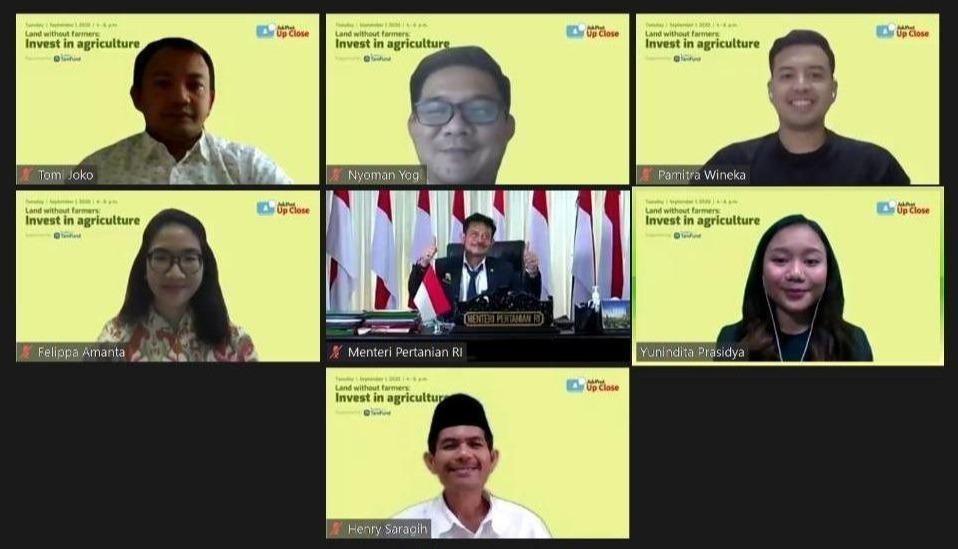Popular Reads
Top Results
Can't find what you're looking for?
View all search resultsPopular Reads
Top Results
Can't find what you're looking for?
View all search resultsInvestment, financing key to sustaining agriculture
The agriculture sector grew 2.19 percent year-on-year in the second quarter of this year, at a time when Indonesia's GDP contracted 5.3 percent. However, the sector has suffered from a low appetite for investment, especially from foreign investors.
Change text size
Gift Premium Articles
to Anyone
T
he Indonesian agriculture sector is in desperate need of increased investment and financing, despite having proven resilient during the pandemic.
The agriculture sector grew 2.19 percent year-on-year in the second quarter of this year, at a time when Indonesia's GDP contracted 5.3 percent.
"These promising figures demonstrate that agriculture can become a powerful engine to resuscitate the economy. Not only has the sector proven its hardiness during the crisis, it has the potential to create additional jobs and employ millions more workers," said Agriculture Minister Syahrul Yasin Limpo during a virtual talk hosted by The Jakarta Post.
However, the sector has suffered from a low appetite for investment, especially from foreign investors. In 2019, foreign direct investment (FDI) in the sector accounted for just 3 percent of total FDI, according to data from the Investment Coordinating Board (BKPM).
Felippa Amanta, the head of research at the Center for Indonesian Policy Studies (CIPS), said investment in agricultural innovation could boost farmers’ productivity.
As many as 20,000 farmers who have partnered with food and beverage company PT Nestlé Indonesia for more than 30 years in Lampung have produced 1.2 tons coffee per hectare each year, according to the think tank’s 2019 study. Their productivity has doubled from 0.5 tons per ha.
“So you have investment in extension services that introduce foreign technology, research and development and improved farming methods,” Felippa said during the Jakpost Up Close webinar.
Despite being an agricultural powerhouse, Indonesia has seen productivity decline for some crops, including the country’s main staple, rice, with productivity dropping 1.74 percent to 5.65 tons per ha in 2019 from 2018, according to data from Statistics Indonesia (BPS).
Tomi Joko Irianto, an official from the Financial Services Authority (OJK), said Tuesday the agriculture sector offered an untapped opportunity for financing from peer-to-peer (P2P) lending companies.
Of the loans provided by P2P lenders in June, only 2.64 percent, or around Rp 1 trillion (US$70.8 million), was channeled to the agriculture, hunting and forestry sectors, according to data from the OJK.
“Access to bank loans is still limited. So P2P lenders are needed, because if farmers cannot get a loan from the bank, they will eventually turn to loan sharks at a very high rate of return,” said Tomi.
Financing in the agriculture sector remains limited, mainly because farmers face numerous challenges, including bad weather, price fluctuations, a lack of technology, poor record keeping and high production costs, as well as weak and inefficient supply chains, which undermine their ability to pay back loans, according to Nyoman Yogi, an operations officer at the International Financial Corporation (IFC).
But banks also avoid providing loans to farmers as they lack knowledge about the agriculture sector, despite employing many graduates from the Bogor Institute of Agriculture (IPB), said Nyoman.
“There are various risks involved in agricultural production and banks think these risks cannot be mitigated,” said Nyoman.
TaniFund, which provides a P2P lending platform for farmers, manages these risks by providing the majority of its loans in the form of goods instead of cash to keep farmers from misusing the funds, according to Pamitra Wineka, who cofounded TaniFund's parent company, agriculture marketplace TaniHub Group.
“And the final part is the post-harvest; we make sure the entire harvest is purchased by buyers associated with TaniHub,” said Pamitra.
“Hopefully, after farmers go to TaniFund several times and they have a credit history, they can eventually go to the bank and become bankable.”
Aside from financing, farmers also face issues like dependency on chemical fertilizers, lack of education and training, as well as inadequate infrastructure, said Henry Saragih, the chairman of the Indonesian Farmers’ Union.
“Agriculture infrastructure development is still inadequate. Dams, irrigation and roads have not evenly met small farmers’ needs,” said Henry. “The roads in many places are not good.”










